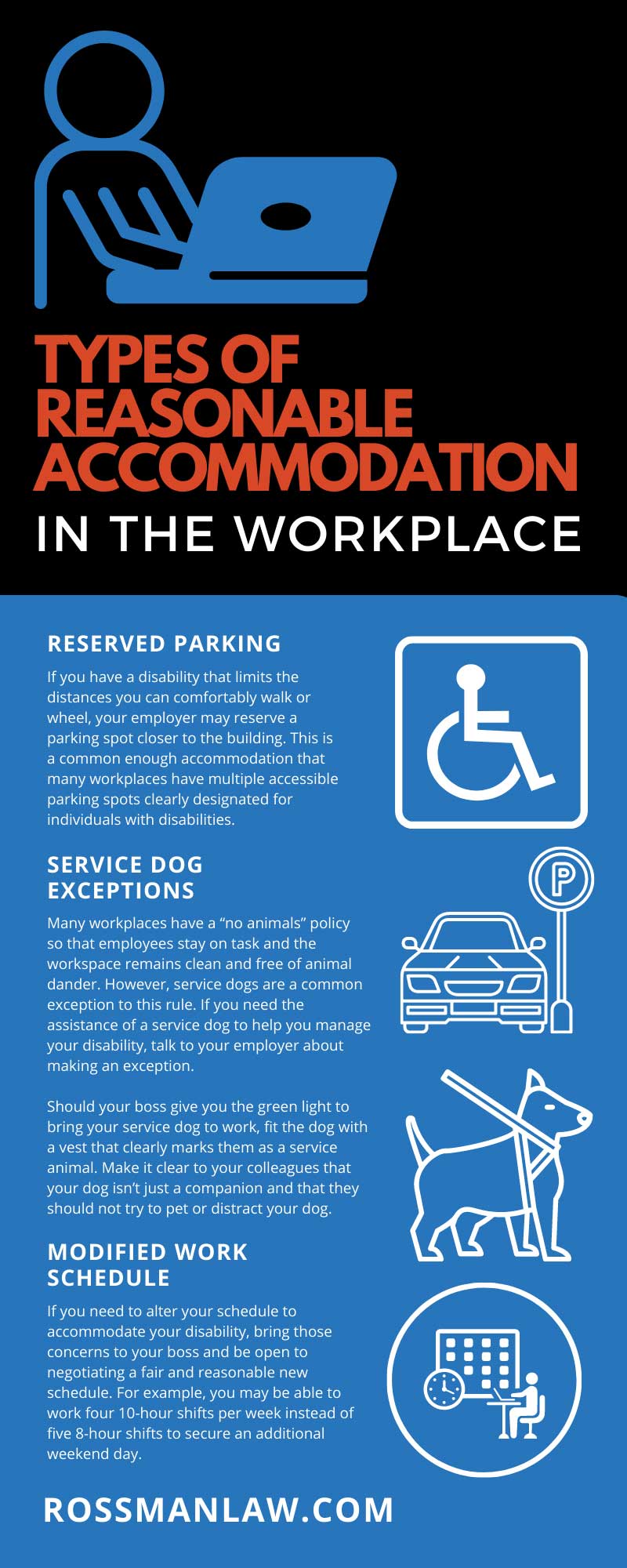
5 Types of Dental Medical Malpractice To Know
April 26, 2023
5 Telltale Signs That You’ve Hired a Bad Attorney
May 10, 2023Under the Americans with Disabilities Act (ADA), employees with disabilities are entitled to reasonable accommodations that allow them to perform the essential functions of their jobs. The ADA defines a disability as “a physical or mental impairment that substantially limits one or more major life activities.”
What types of accommodations are considered reasonable, though? Rossman Law Group’s team of attorneys has years of experience with disability and employment law, and we’ve compiled a list of 10 types of reasonable accommodation in the workplace. Talk to your employer if you feel you would benefit from any of these accommodations—and contact Rossman Law Group if you encounter resistance or discrimination.
Reserved Parking
If you have a disability that limits the distances you can comfortably walk or wheel, your employer may reserve a parking spot closer to the building. This is a common enough accommodation that many workplaces have multiple accessible parking spots clearly designated for individuals with disabilities.
Service Dog Exceptions
Many workplaces have a “no animals” policy so that employees stay on task and the workspace remains clean and free of animal dander. However, service dogs are a common exception to this rule. If you need the assistance of a service dog to help you manage your disability, talk to your employer about making an exception.
Should your boss give you the green light to bring your service dog to work, fit the dog with a vest that clearly marks them as a service animal. Make it clear to your colleagues that your dog isn’t just a companion and that they should not try to pet or distract your dog.
Quiet Space
Are you easily distracted by noise and conversation near your workspace? Conditions like ADHD qualify as disabilities under the ADA, though your boss may ask for documentation from your physician to confirm the condition. Moving you to a quiet area further away from distractions is a reasonable, easy, and low-cost accommodation.
Modified Work Schedule
Individuals with disabilities may ask for changes to their job schedule for any number of reasons. Perhaps they have regular doctor’s appointments, or flare-ups of chronic conditions may require time off to recuperate.
If you need to alter your schedule to accommodate your disability, bring those concerns to your boss and be open to negotiating a fair and reasonable new schedule. For example, you may be able to work four 10-hour shifts per week instead of five 8-hour shifts to secure an additional weekend day.
Telecommunications Devices for the Deaf (TDDs)
If you have difficulties with hearing or speech, making and receiving telephone calls on a standard phone may be out of the question. Ask your boss if you can use a TDD instead; a telecommunications device for the deaf is a teleprinter that allows you to use text-based communication over a phone line.
Should your boss refuse to accommodate your hearing loss, talk to a disability attorney in Boise, Idaho, about the options available to you. Refusing to offer reasonable accommodation could place some legal liability on your employer.
Large Print Materials
If you have very low vision, reading size-12 font on printed materials and computer screens may cause undue eye strain and difficulty comprehending the material. Ask your supervisor if you can receive any printed materials you need in large print and use a magnifier on your computer screen. This accommodation is reasonable because it is inexpensive, easy to do, and does not interfere with other employees’ ability to do their jobs.
Adjustable Desks
Do you work at a desk job where every desk is the same, yet you have difficulty accommodating your wheelchair so you can work comfortably? Bring your concerns to your supervisor and ask if they have any ADA-compliant desks in storage.
For a desk to comply with the ADA, it must have a clearance of at least 27 inches to accommodate the extra height of a wheelchair. Using an ADA desk can quickly transform your workspace into a comfortable spot for your daily tasks.
Screen Readers
Individuals with very low vision can still use a computer and surf the Internet with the help of a screen reader. Screen readers are software programs, or even browser extensions, that read the text on a screen aloud. This accommodation is easy to set up and does not place undue hardship on the employer, so the ADA deems it reasonable.
However, you will probably have to use headphones or earbuds with your screen reader to avoid distracting your colleagues. Your accommodation cannot interfere with their ability to perform their jobs.
Job Reorganization
Are there non-essential parts of your job that are unduly difficult to perform with your disability? Ask your employer if some of those more marginal tasks can be reassigned. For example, if you have a speech-sound disorder that is exacerbated under pressure, ask if you can work in the back office instead of the customer service desk.
Keep in mind that reorganization and restructuring of job tasks is often an accommodation of last resort. Your employer may argue that the task you thought was non-essential is actually an expected function of your job. Tell your story to a disability lawyer if you are unsure of the veracity of your employer’s claims.
Flexible Leave
Depending on the unique aspects of your disability, you may need to take unexpected breaks from work to undergo medical treatment or recuperate from exhaustion. Ask your company’s human resources department about flexible leave options that may be available to you. They may ask you to explain or provide documentation for the nature of your disability, so be prepared to answer honestly and professionally.
If you are a qualified employee with a disability, you are entitled to ask for reasonable accommodation to make your workplace more accessible to you. Several types of accommodations, like the ones described above, are more common than you may think.
Should you experience pushback from your boss, or if they argue that your requests are unreasonable, reach out to Rossman Law Group for a free legal consultation. We’ll listen closely to the details of your situation and offer reliable advice about the options available to you.






